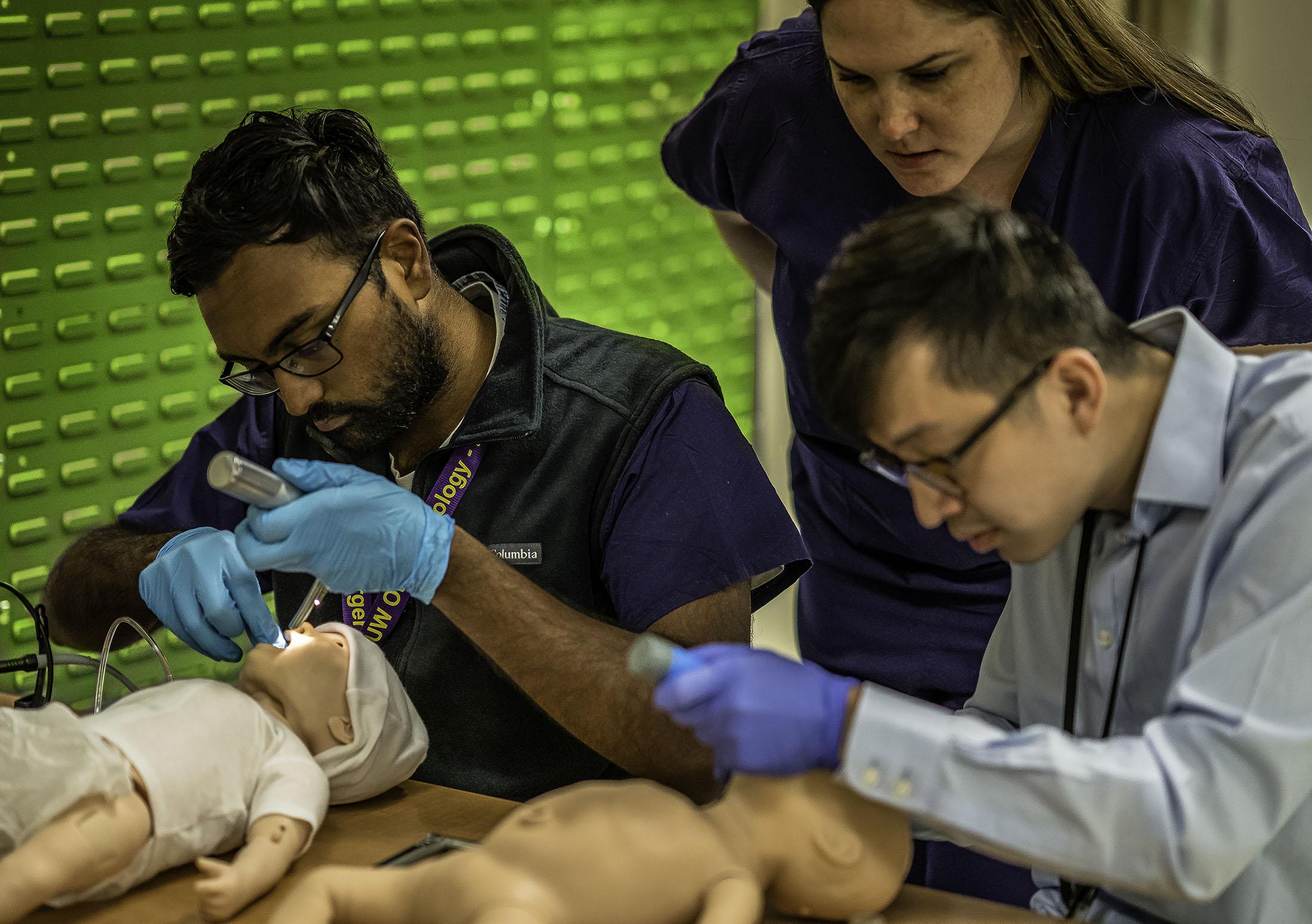Checking out the Area of Otolaryngology: What to Anticipate When You Seek Advice From an ENT
Otolaryngology, generally described as ENT, includes the diagnosis and therapy of nose, throat, and ear conditions. For those experiencing related problems, seeking advice from an ENT expert can give clearness and alleviation. Understanding what to anticipate throughout such consultations is crucial for reliable communication and treatment. This overview will certainly describe vital aspects of the ENT experience, including usual reasons for check outs and the processes associated with diagnosis and therapy.

Recognizing Otolaryngology: An Overview
Otolaryngology, frequently described as ENT (Throat, nose, and ear) medication, is a specialized branch of medication that concentrates on the medical diagnosis and treatment of problems affecting these essential locations of the human body. This area encompasses a vast array of problems, including those pertaining to hearing, equilibrium, breathing feature, and speech. Otolaryngologists are educated to manage both surgical and medical therapies, utilizing advanced strategies and technologies. Their competence extends beyond typical ailments, dealing with problems such as allergic reactions, sinus infections, and hearing loss. Furthermore, they play a vital function in the administration of head and neck cancers, supplying thorough care customized to specific person needs. On the whole, otolaryngology remains vital for maintaining health and wellness and lifestyle in affected people.
Typical Reasons to See an ENT Expert
Many people seek the experience of an ENT professional for a variety of reasons, mirroring the diverse nature of problems that affect the ear, throat, and nose. Typical problems include chronic sinusitis, which often results in persistent nasal congestion and face pain. Allergies and their linked symptoms, such as itching and sneezing, also trigger visits to these specialists (ENT Doctor). Hearing loss, whether steady or sudden, is another significant reason for appointment. Additionally, individuals may look for analysis for throat disorders, consisting of consistent hoarseness or ingesting problems. Rest apnea, characterized by interrupted breathing during sleep, is often resolved by ENT professionals. Each of these problems highlights the significance of specialized treatment in handling complex ENT-related health and wellness problems
Getting ready for Your ENT Visit
When getting ready for an ENT appointment, it is vital to gather relevant details and think about any type of particular concerns. People should assemble a detailed case history, including previous ear, nose, or throat issues, surgical procedures, and present medicines. Recording symptoms-- such as extent, regularity, and period-- can provide beneficial understandings for the ENT professional. Additionally, people should prepare a listing of concerns they want to ask, ensuring that all issues are resolved during the check out. Bringing along any pertinent clinical records or examination results can better assist the ENT in recognizing the client's problem. Finally, individuals ought to validate their visit information, consisting of time, date, and place, to lessen any last-minute complication. Correct preparation can boost the effectiveness of the examination and cause much better results.
What to Expect During the Appointment
As the appointment starts, the individual can expect to engage in a detailed discussion with the ENT expert regarding their signs and clinical background. The specialist will certainly inquire about the period, regularity, and intensity of signs such as hearing loss, nasal congestion, or aching throat. In addition, the person's previous clinical conditions, drugs, and any kind of appropriate family background will certainly be evaluated, aiding the professional in creating a complete understanding of the person's health. The ENT might also inquire about way of living variables, such as exposure to toxic irritants or irritants. This open discussion establishes a structure for the consultation, ensuring that the patient's problems are addressed and setting the phase for any type of necessary evaluations or referrals for treatment.
Diagnostic Examinations and Treatments in Otolaryngology
An array of diagnostic examinations and treatments are vital in otolaryngology to properly examine and identify problems affecting the ear, nose, and throat. Usual tests consist of audiometry, which gauges hearing function, and tympanometry, assessing middle ear pressure. Nasal endoscopy allows visualization of the nasal passages and sinuses, while laryngoscopy examines the throat and singing cables. Imaging methods, such as CT scans and MRIs, supply detailed sights of head and neck structures. Allergy testing might additionally be carried out to identify triggers for sinus or respiratory problems. These analysis devices make it possible for ENT experts to establish a thorough understanding of patients' problems, guaranteeing customized and reliable monitoring plans. Appropriate medical diagnosis is important for effective therapy results in otolaryngology.
Therapy Options Supplied by ENT Specialists
ENT experts use a variety of treatment options tailored to attend to specific problems affecting the ear, throat, and nose. These therapies range from traditional strategies, such as medicine and lifestyle adjustments, to more invasive procedures. As an example, allergic reactions might be taken care of with antihistamines or immunotherapy, while persistent sinus problems may require nasal corticosteroids or sinus surgery. For hearing loss, ENT specialists commonly recommend listening devices or medical interventions like cochlear implants. In situations of throat conditions, alternatives can include speech therapy or medical treatments to eliminate obstructions. In addition, they might supply assistance for managing sleep apnea, consisting of using CPAP tools or surgical treatments. On the whole, the goal is to improve people' Go Here top quality of life with individualized care and reliable treatment techniques.
When to Look For Follow-Up Care With an ENT
Identifying when to look for follow-up care with an ENT professional is crucial for managing recurring signs and symptoms or difficulties related to nose, throat, and ear conditions. Individuals must consider arranging a follow-up appointment if signs and symptoms linger regardless of first therapy, such as persistent ear pain, nasal congestion, or throat pain. Changes in hearing, equilibrium problems, or unusual nasal discharge might also require additional analysis. In addition, if a person experiences side effects from recommended drugs or has actually gone through an operation, follow-up treatment is vital to keep track of recovery and resolve any type of concerns. Timely examinations can assure reliable administration of problems, avoid possible problems, and provide comfort relating to one's wellness. Seeking follow-up care promotes aggressive health and wellness administration in otolaryngology.
Frequently Asked Inquiries

What Qualifications Should I Search for in an ENT Professional?
When looking for an ENT professional, one need to try to find board qualification, pertinent experience, and strong client testimonials. Furthermore, efficient interaction skills and a compassionate approach can significantly boost the general treatment experience.
Exactly how Do I Choose the Right ENT for My Demands?
Picking the best ENT expert entails reviewing their certifications, experience, and client reviews (ENT). It is vital to contemplate their interaction style and method to treatment, ensuring they straighten with the person's details health and wellness demands and preferences
Are There Any Dangers Associated With ENT Procedures?
The risks connected with ENT procedures might include infection, blood loss, anesthetic complications, and potential damage to bordering structures. Clients need to talk about these threats with their medical professional to understand private concerns and assurance informed decisions.
Exactly How Can I Take Care Of Anxiety Before My ENT Appointment?
To manage anxiety before an appointment, people can exercise deep breathing internet exercises, picture positive results, prepare concerns ahead of time, and look for support from friends or family members, promoting a feeling of peace of mind and peace.
What Should I Do if I Experience Negative Effects From Therapy?
If negative effects from therapy happen, the individual ought to promptly report them to their doctor. Modifications to therapy or extra interventions might be essential to assure safety and effectiveness in managing their condition - ENT surgery. As the appointment hearing age test begins, the person can expect to engage in a comprehensive conversation with the ENT professional regarding their symptoms and clinical history. These diagnostic devices allow ENT professionals to establish a complete understanding of people' problems, ensuring customized and effective administration strategies. ENT professionals supply a variety of therapy alternatives tailored to deal with details problems affecting the throat, ear, and nose. When seeking an ENT expert, one must look for board accreditation, pertinent experience, and strong individual reviews. Choosing the appropriate ENT specialist involves assessing their qualifications, experience, and person reviews
 Mr. T Then & Now!
Mr. T Then & Now! Mason Gamble Then & Now!
Mason Gamble Then & Now! Macaulay Culkin Then & Now!
Macaulay Culkin Then & Now! Batista Then & Now!
Batista Then & Now! Nicholle Tom Then & Now!
Nicholle Tom Then & Now!